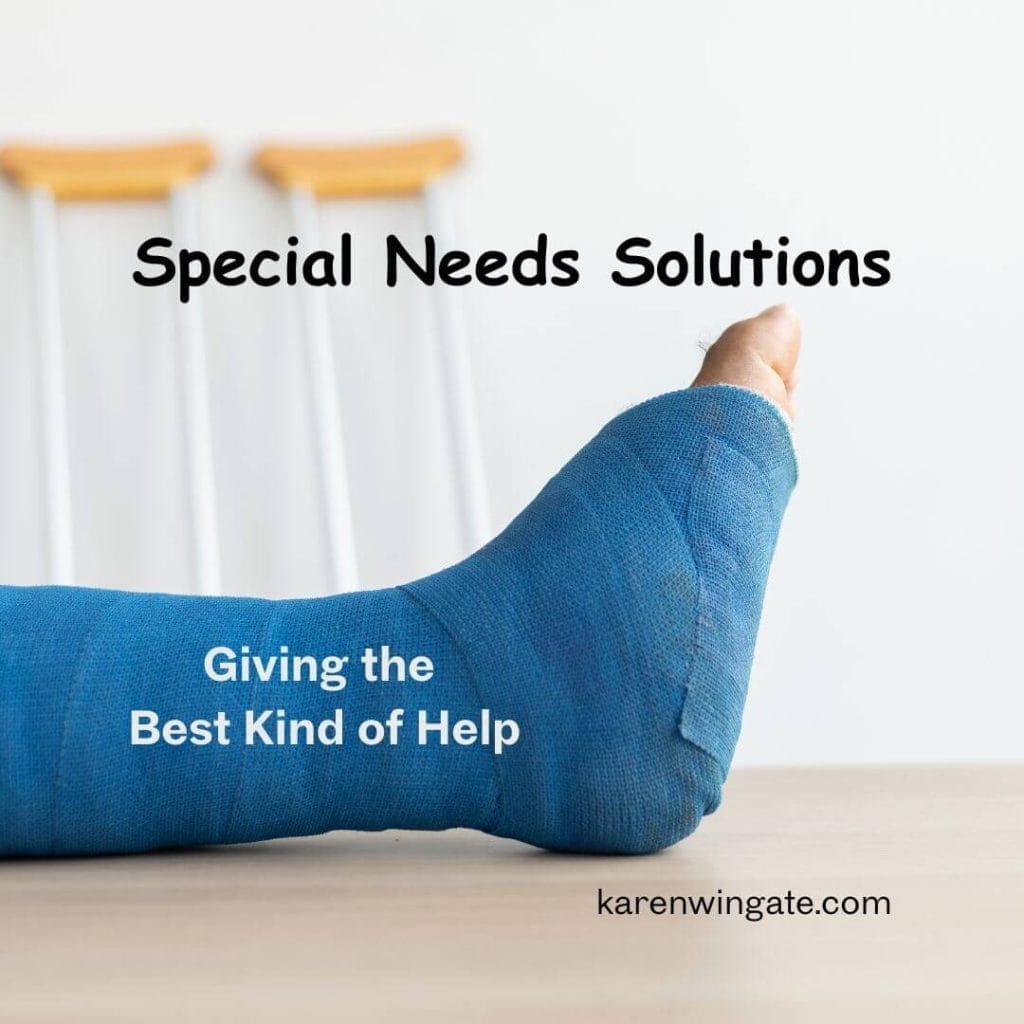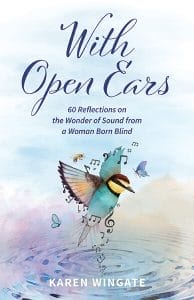
In the early days of handicapped parking spaces, my able-bodied mother parked the family car in front of a local store and got out. A man standing on the sidewalk proceeded to berate my mother for taking a parking spot intended for the disabled. Just then, my stepdad appeared from the passenger side. Bob had suffered multiple crippling issues since a bout with rheumatic fever in his childhood. Then, when he was a senior in high school, a fellow student pushed him down a flight of stairs. Due to the accident and improper medical help in the 1950s, Bob’s hips were fused in a sitting position. Refusing to use a wheelchair or crutches, Bob walked, bent at the waist. He compensated by bending his knees so he could look straight ahead.
The guy couldn’t disappear fast enough.
Yes, he was wrong, but he didn’t know.
A few years later, I was in a 4-H public speaking contest and lost a first-place seeding by two points. Afterwards, one of the three judges approached me. “I took two points off your score because your eyes wiggled. That’s a distraction to the audience,” she told me. I informed her that my wiggling eyes were due to a genetic defect called nystagmus. I couldn’t control the movement.
“Oh.” She ducked her head. “I’m sorry. But the judges’ decision is final.”
She didn’t know.
Fifty years later, even after Better Than Ever eyesight, I still don’t handle everyday moments like other people do. My miracle surgery was only in one eye and brought the acuity from 20/200 to 20/80. I still have nystagmus, and my other eye doesn’t function. Many people assume that, since my vision is better and I look like I’m doing fine, I must be okay. At the most, people conclude I probably have trouble reading signs and navigating curbs, and we make jokes about my inability to drive. They have no clue how my wonky eyes impact and impede small everyday tasks.
It’s to my credit, I suppose, that those closest to me forget I can’t see well. They assume I should be able to find another person in a crowded room, catch a ball my grandson awkwardly throws at me, know the size of a piece of food in a buffet line, scroll through my texts to find information someone sent me three months ago, or be able to read the Uber app to get a ride rather than asking a friend.
I’ve humorously said, “I’m not stupid. I just can’t see.” Under my breath I mutter, “I’m not lazy either. And yes, I’m not in my usual overcomer mode today, for today I am already exhausted from trying to see my world and I’d like to save whatever energy I have left for other matters. Please . . . do for me what would take you 30 seconds to do but would take me ten minutes—at least—if at all.”
I halt my diatribe. They don’t know.
Even if they ask and I tell them, they still may not understand. Or, loaded with their own snags, they may easily forget the next time around. Just as I can’t comprehend what it is like to be able to see, they can’t fathom how I am able to not see. (Your eyes work together? I want to say. Why would anyone need two eyes to see? One eye is doing just fine for me . . . well, sort of.)
I also forget that others might function in ways unique to them. I know I shouldn’t turn my head away when speaking to my hard of hearing relatives. But habits are stubborn things, and it’s a glitch in my mental routine to remember to change my modus operandi so I can be heard. My head turning divulges that I wish things could be different. It takes time and effort to lay aside our own life agenda and breaks our auto-pilot routine to enter another’s world, notice their struggle, and let go of our own perception of how things are done to “do it their way.”
What’s the solution?
The obvious answer is that we all need to slow our pace on life’s path so we can discover how the people near to us approach life differently. Whether someone is facing a broken body, marriage, or heart, everyone faces unique challenges that others don’t understand unless they ask. We need to have the humility to admit that we don’t know all that is happening in someone else’s world, and we need to guard against making judgments without knowing more information.
“What is it like to be . . . ?”
Unless you’ve walked in another person’s shoes, you don’t know what it is like to deal with their singular life situation. How can you know the difficulty of their life walk unless you’ve had a similar experience? You can’t. But the next best thing to walking in their shoes is to walk beside them. Create time to observe their life moments. Ask questions. Attempt to help, even if it feels clumsy at first.
But It’s a two-way street. I need to have more compassion for those who fail to respond to my request for whatever reason. It’s called grace. Yes, others won’t always respond like I’d like them to. Either they don’t know, it takes multiple times to let the knowledge sink in, or that other person is facing their own limitations and they don’t have the energy or brain power to do one more thing.
It’s also called forgiveness. There will be times we cannot excuse someone’s insensitivity. Let’s just say it bluntly. They were a jerk. The world contains all kinds of flawed people and I’ve had my jerk moments too.
How to react when someone lets you down
If someone hasn’t met your need as you would like, here’s how you can respond with grace and forgiveness.
- Pray for them
- Look for a teachable moment.
- If that moment doesn’t come in your timeframe, pray more.
- Use their insensitivity to ask God to show you when you’ve been indifferent to the needs of others and how you can do a better job.
“I do not want to mess this up!”
Let’s return to the one who helps. Who knows–the Lord may be using your loving but inexperienced efforts to prepare you for something greater in your life. Several people have told me I am the first severely visually impaired person they’ve met. A few say God has used their acquaintance with me to prepare them to engage effectively with another visually impaired person. One friend told me it was her friendship with me that helped her love and accept the totally blind man she would ultimately marry. What a comfort to know that God has used my life to help others grow in sensitivity and love for others!
You may be the clumsy one at responding appropriately to a special need. Or, someone may have treated you poorly when you were not all you wanted to be. Each side needs to take a deep breath and praise God that He is the God of second chances. He will use that experience to make each of us better prepared for the next time. In the meantime, pray for wisdom to know how best to respond ieven if you don’t understand what the other person faces.
For more on how to reach out to someone in need, check out Karen’s book, With Open Ears: 60 Reflections on the Wonder of Sound from a Woman Born Blind. Chapter 20 tells how you can enter the space of someone with unique needs.


Thank you, Karen. You continue to model to your readers the beauty of surrendering to God, wonderfully allowing Him to bring others closer to Him. Rock on, sister!